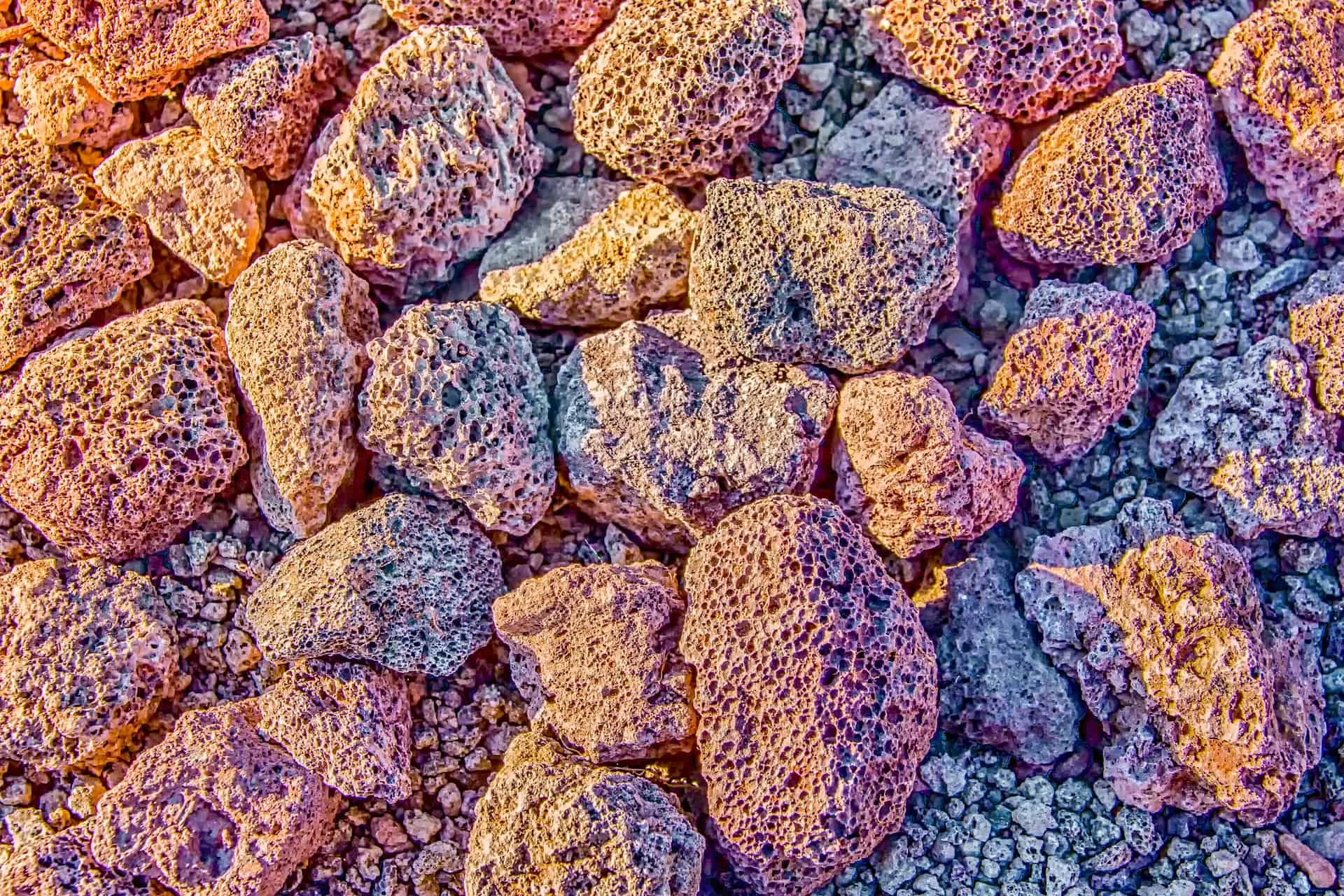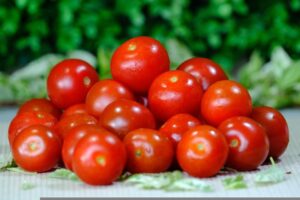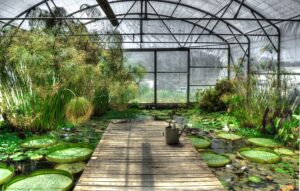If you’re looking for a hydroponic substrate then you already know there are plenty of options available. Hydroton and lava rocks are two common options, and each one comes with its own benefits and drawbacks. That’s why we put together this Hydroton vs Lava Rocks comparison guide to help you choose the right hydroponic medium.
Hydroton Alternative
Hydrofarm GROW!T Clay Pebbles (Buy Online) make a great Hydroton alternative if you’re just looking to avoid the high price of Hydroton. They are made of the same material as Hydroton, but they usually cost about thirty percent less per liter.
If the price of Hydroton is leading you to look into Lava Rocks as an alternative hydroponic substrate then you should check out Hydrofarm GROW!T (View Price)
However, lava rocks have a number of beneficial attributes besides their price, which we’ll cover in more detail in the rest of this article.
Hydroton vs Lava Rocks – Which is better?
Both Hydroton and Lava Rocks have their own unique advantages and disadvantages in each type of hydroponic setup. Hydroton will perform better in hydroponic systems that require a lighter and more uniform substrate.
Lava rock will perform equally well in most situations, but its uneven shape and weight can sometimes become a problem.
Hydroton is great for drip systems, nft, and any other type of hydroponic system where you only need to fill mesh pots. However, it can get expensive if you need to fill a large volume, or if you need to fill a lot of pots.
They both have a limited water-holding capacity, so they should only be used in hydroponic systems that deliver a steady supply of moisture to the growing medium. Otherwise, if you need a hydroponic substrate that can hold more water then Rockwool or coco coir is a better option.
Hydroton / Expanded Clay Pebbles
Hydroton (Buy Online) is a Lightweight Expanded Clay Aggregate (L.I.C.A.) that is made in Germany for use in commercial and small scale hydroponic systems. It is made from natural clay that is pressed into pellets, and then the pellets are kiln-fired at high temperatures which cause the clay to expand.
Hydroton expanded clay pellets hold more water than lava rocks, and they provide a good amount of oxygenation to a plant’s root zone. Hydroton pellets also have a very uniform shape and size, and they have an attractive natural reddish clay color.
Hydroton pH:

Hydroton is chemically inert, and it has a neutral pH. Hydroton also won’t leach any metals into your hydroponic reservoir.
Is Hydroton Sterile?
The high-temperature manufacturing process sterilizes Hydroton pellets, but storage in damp conditions can cause mold to grow in the bag.
Is Hydroton Dust Free?
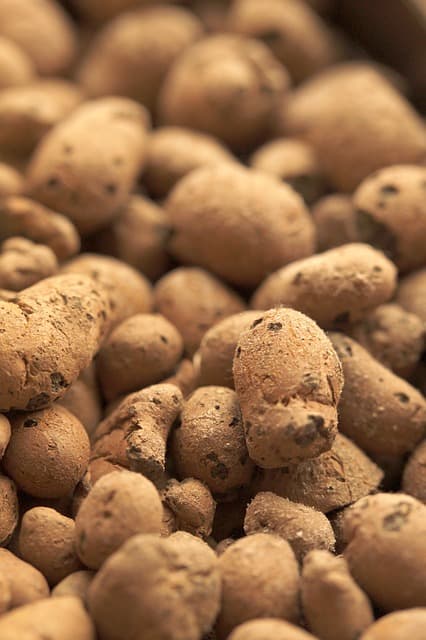
Hydroton is relatively dust-free right out of the bag, but it’s still a good idea to give it a light rinse before you add the pebbles to your hydroponic system. However, they are much cleaner than lava rocks which need to be thoroughly washed before you use them.
Hydroton Weight
One of the things that really stands out when comparing Hydroton vs Lava Rocks is their weight. Hydroton weighs about one pound per liter, while lava rocks usually weigh 1.5 pounds per liter depending on their size.
Pros:
Hydroton is very easy to clean. The round clay pellets have a smooth surface that won’t trap dirt and debris.
Chemically stable and they won’t alter pH
Reusable
Multiple sizes
Very lightweight compared to lava rock
Uniform shape and size. Easily fits into net pots and small containers
Easy to pour, and they fill containers evenly
Hydroton won’t compress easily, but they aren’t as durable as lava rocks
Cons:
Harder to find in stores than lava rocks
Plants are less stable in Hydroton since they are lightweight and have a rounded shape. Roots have a hard time gripping the pellets, which can cause plants to fall over or lean.
Hydroton can have trapped air pockets and they can float in a flood and drain system.
Hydroton can release clay dust over time which can damage water pumps or clog filters and drains
Clay pebbles can slowly break down in low pH water
Hydroton is fragile and it can easily shatter and break
Lava Rocks
Lava Rocks (Buy Online) are very affordable, and they are readily available in most stores that carry gardening supplies. Their low price makes them a perfect fit for systems where you need to use a lot of substrate like in an ebb and flow system, or in an aquaponics system where the substrate pulls double duty as a biological filter.
Is Lava Rock pH Neutral?
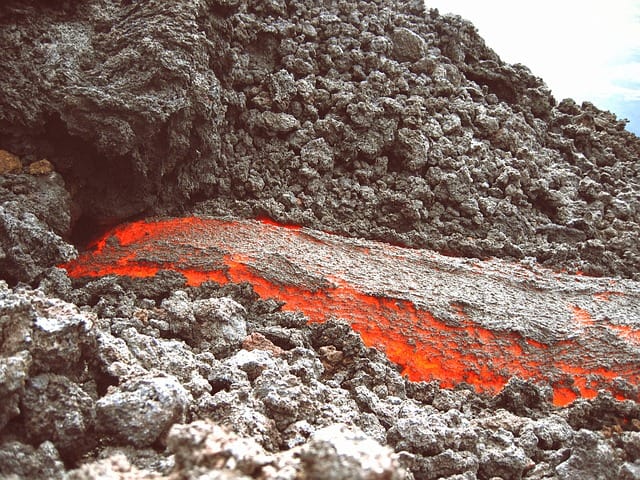
Lava rock is naturally pH neutral since itis made of basalt which is a non-reactive metamorphic volcanic rock. Basalt also doesn’t contain any elements like calcium that can increase the pH in your hydroponic systems reservoir. However, basalt can contain trace amounts of heavy metals which usually won’t affect plants or aquatic life.
Lava Rock Size & Colors:
Lava rock comes in a wide range of shapes and sizes. The small 3/8-inch rocks are usually better for use in mesh pots, but the larger ¾ to 1-inch rocks work well in buckets and trays.
You can also get lava rocks that come in a few different colors. The most common colors are black and red, but you can find lava rocks in a wide variety of shades of black and red depending on the mineral composition of the volcano where they were formed.
Lava Rock Porosity:
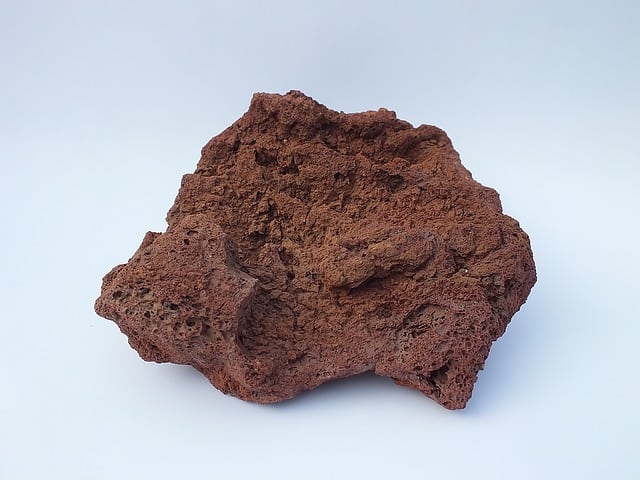
Lava rock has more pores than Hydroton since it has a naturally sintered structure. That allows it to provide more oxygen to plants roots. However, it has less water-holding capacity than Hydroton, so it can dry out quickly when your hydroponic systems pump shuts down.
Pros:
Keeps plants firmly in place since lava rock grips a plant’s roots, and it’s heavier than Hydroton.
Won’t alter pH and it’s infinitely reusable.
Readily available in most garden centers and online, very inexpensive
Lava rock comes in multiple different shapes and sizes
Lava rocks are very durable and they are hard to crush
Cons:
Lava rocks need to be washed before use since they are usually covered in dust
Lava rocks can accumulate dirt and debris and their complex pore structure makes them harder to clean than Hydroton.
Lava rocks weigh more than Hydroton. That makes them a little more costly to ship and they can be cumbersome to move around
Lava rocks contain small amounts of heavy metals that can cause nutrient imbalances if you don’t flush your reservoir frequently.
The natural shape of lava rocks can cause uneven wetting of the root zone in a deep hydroponic substrate.
Is Lava Rock pH Neutral?
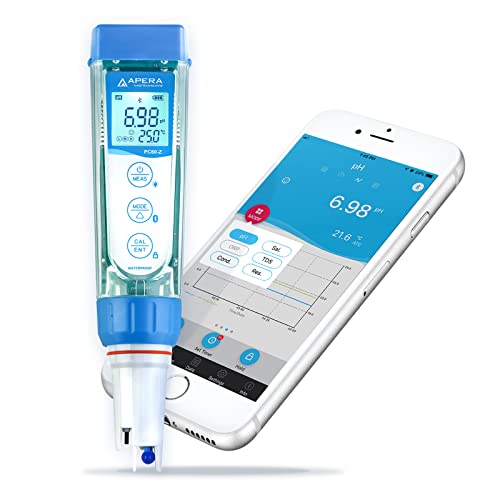
Lava Rocks are pH neutral but they can leach out trace amounts of heavy metals which can cause small pH swings. In most cases, you won’t see a change in the pH of your reservoir unless you’re using a very precise EC/pH meter.
Rocks That Raise pH
Dolomite Limestone (Buy Online) is one of the best rocks that raise pH. If you have very soft water then you can add a small amount of dolomite to your hydroponic systems reservoir to bring the pH up. Dolomite is also unique since it contains magnesium, which is an important plant nutrient that’s vital to photosynthesis.
Rocks That Lower pH
There aren’t any rocks that lower pH to any significant degree. If you need to lower the pH in your hydroponic system you’ll need to use a product like General Hydroponics pH Down (Buy Online).


